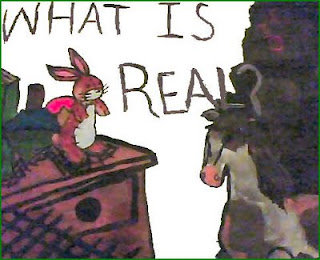>[Scroll down to read about the letters A-Q as “A Sinner’s Lenten Alphabet” continues.]
Letter
R
Is
For
Real
“What is REAL?” asked the Rabbit one day, when they were lying side by side near the nursery fender, before Nana came to tidy the room. “Does it mean having things that buzz inside you and a stick-out handle?”
“Real isn’t how you are made,” said the Skin Horse. “It’s a thing that happens to you. When a child loves you for a long, long time, not just to play with, but REALLY loves you, then you become Real.”
“Does it hurt?” asked the Rabbit.
“Sometimes,” said the Skin Horse, for he was always truthful. “When you are Real you don’t mind being hurt.”
“Does it happen all at once, like being wound up,” he asked, “or bit by bit?”
“It doesn’t happen all at once,” said the Skin Horse. “You become. It takes a long time. That’s why it doesn’t happen often to people who break easily, or have sharp edges, or who have to be carefully kept. Generally, by the time you are Real, most of your hair has been loved off, and your eyes drop out and you get loose in your joints and very shabby. But these things don’t matter at all, because once you are Real you can’t be ugly, except to people who don’t understand.”
A few years ago I used this passage from The Velveteen Rabbit by Margery  Williams, “On Being Real” as a springboard for a discussion on finding balance in our lives. We talked about healing the gap between our spiritual and our “secular” lives—about being authentic.
Williams, “On Being Real” as a springboard for a discussion on finding balance in our lives. We talked about healing the gap between our spiritual and our “secular” lives—about being authentic.
Times of renewed spiritual intensity—like Great Lent—often shine a light into the dark crevices of our broken lives, and what we see can be overwhelming. One unhealthy response is to “pretend” … to go through the motions of an acetic struggle, without engaging on a personal level.
The Skin Horse teaches us several important things about becoming Real—that you accept pain as part of the process; that having sharp edges and needing to be “carefully kept” prevent the process; and that letting people love you is a key. “Once you are real you can’t be ugly, except to people who don’t understand.”
Metropolitan Anthony Bloom, in his short book, Meditations on a Theme, writes about the “process of becoming” and the importance of “considering ourselves as a whole” in order to progress in the spiritual life:
“… unless we take full responsibility for the way we face our heredity our situation our God and ourselves, we shall never be able to face more than a small section of our life and self…. Certain things in us belong already, however incipiently, to the Kingdom of God. Others are still a chaos, a desert, a wilderness. And it is for us by hard toil and inspired faith to make the into the Garden of Eden; as Nietzsche says, ‘One must possess a chaos within to give birth to a star.’ And we must have faith in the chaos, pregnant with beauty and harmony. We must look at ourselves as an artist looks, with vision and sobriety at the raw material which God has put into his hands and out of which he will make a work of art….”
a chaos within to give birth to a star.’ And we must have faith in the chaos, pregnant with beauty and harmony. We must look at ourselves as an artist looks, with vision and sobriety at the raw material which God has put into his hands and out of which he will make a work of art….”
[I have that Nietzsche quote on this magnet on my refrigerator.]
It’s so easy, I think, to try to copy the way godliness looks on others—whether it be their mode of fasting, prayer, good works, or even the way they wear their spirituality in their body language, the tone of their voice, or the way they dress. There is nothing innately spiritual about dressing a certain way (head covering or not, for example) or speaking a certain way (subdued tones in the voice) or carrying yourself a certain way (quietly, with slow steps or hurrying along to your next task.) For several years I tried to copy some of these outward signs of the spiritual lives of others, but I wasn’t being authentic.
Met. Bloom continues:
“At every instant of our lives we can be authentic and real if we choose the risk of being what we are and of not aiming at copying a model or identifying ourselves with preconceived images. But our true self cannot be discovered merely by watching our empirical self, but only in God and through him. Each of us is an image of the Living God, but an image which, like an old painting that has been tampered with overlaid or clumsily restored to the point of being unrecognizable…. “
Many of the services of Great Lent—especially the ones that include the Canon of St. Andrew of Crete—offer an opportunity for us to face our sinfulness. I’m sure these are written and offered by the Church to help us see that aspect of ourselves as an aid to repentance. But at the same time, As Bloom says:
“It is important for us to learn both how far we are outsiders and how richly we are already endowed with his presence, by the light enclosed in our darkness; our very potentialities can be an inspiration, a way, a hope; how little we need hurry but how important it is to be real, to occupy in relation to God and to the world around us the true situation which is ours, within which God can act. For He cannot act in an unreal situation, in which we are continually placing ourselves through imagination, fantasy, desire and spiritual gluttony, as the Fathers of the Desert say.”
I know that’s a lot to take in. And maybe living an authentic life isn’t a struggle for you, but it’s at the heart of my struggle. The “signature” quote at the end of my outgoing emails is this:
“It takes courage to grow up and turn out to be who you really are.” ~~ E.E. Cummings
Past posts about Metropolitan Bloom are here:
Beginning to Pray
Scootch, Scootch, God, or Grace, Eventually

2 thoughts on “>On Being REAL”
Comments are closed.